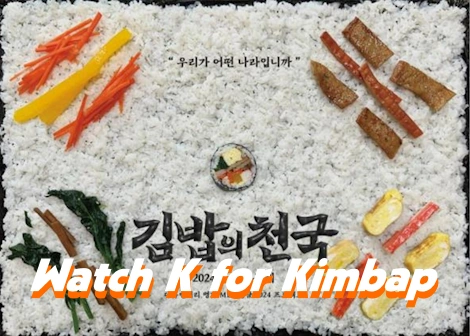The MBC and Netflix series “kimbap Heaven” takes viewers on a journey to discover every famous gimbap restaurant across South Korea. Gimbap is a nostalgic food filled with childhood memories of mothers packing special lunchboxes for important occasions. Today, gimbap has transcended Korea and sparked a global craze.
The Netflix documentary series “Gimbap Heaven” starts with Chungmu Gimbap, a representative dish of Tongyeong in Gyeongnam Province, and features a wide variety of unique gimbap including egg gimbap, dried radish greens (siraegi) gimbap, seaweed (tot) gimbap, pancake gimbap, mackerel gimbap, bracken fern gimbap, Jeju black pork gimbap, Gangwon buckwheat noodle gimbap, pollack tempura gimbap, and spicy chili gimbap, among others.
The series introduces 21 renowned gimbap restaurants nationwide, sharing stories embedded in each roll that reflect modern Korean history and culture.

Netflix Watch K for Kimbap
- 천국의 김밥 , キンパ天国,
- Genre: Documentary
- Broadcaster: MBC Gyeongnam
- Producer: Lee Haena
- Writer: Cha Seonyeong
- Narrator: Nam Dohyeong
- Music: HIMINN
- Streaming on: Netflix
Table of Contents
Jeongsikdang, Seoul
Located in the heart of Seoul, Jeongsikdang is a Michelin 2-star fine dining gimbap restaurant known for their unique gimbap that uses crispy seaweed chips stuffed with rice seasoned with soy sauce and sesame oil. Led by Chef Im Jeong-sik, Jeongsikdang is recognized internationally as a pioneer of “New Korean Dining” and has a branch in New York, USA. The Seoul flagship consistently earns Michelin stars each year and has appeared multiple times on Asia’s 50 Best Restaurants list.
Jeongsikdang’s gimbap is a signature dish blending delicate fine dining techniques with traditional Korean elements. Instead of regular seaweed, they use crispy seaweed chips, creating a distinct texture and nutty flavor. Their gimbap comes in basic and premium varieties, with the basic “Delicious Gimbap” priced around 25,000 KRW. The premium “Assorted Gimbap” topped with Korean beef, sweet shrimp, wild greens, and caviar costs about 70,000 KRW extra, elevating both taste and refinement.
(Prices may vary depending on the establishment.)
- Address: 11 Seolleung-ro 158-gil, Gangnam-gu, Seoul 서울특별시 강남구 선릉로158길 11
- Hours: Daily 12:00–15:00 (Lunch), 18:00–22:00 (Dinner)
- Phone: 02-517-4654
Tongtong Kimbap, Namdaemun, Seoul
Tongtong Gimbap, loved for many years in Namdaemun Market, is famous for its generously filled gimbap as its name suggests. Located in the alleyways of Namdaemun Market, the original Tongtong Gimbap offers many varieties made with fresh ingredients and care, recognized for supplying the Blue House and the National Assembly.
Tongtong Gimbap offers everything from basic gimbap to spicy pickled chili, tuna, cheese, and spam egg gimbap, catering to diverse tastes. Its healthy brown rice gimbap and richly filled premium gimbap have become market favorites.
- Address: 6-13 Namdaemun Market 2-ga-gil, Jung-gu, Seoul 서울특별시 중구 남대문시장2가길 6-13
- Hours: 07:00–16:00 (Early closing possible if ingredients run out)
- Phone: 02-3789-4833
- Menu highlights and prices:
Monyeo Kimbap, Gwangjang Market, Seoul
Monyeo Gimbap, operating in Gwangjang Market since 1975, is widely known as “Addictive Gimbap” by visitors both local and abroad. Despite its simple menu, it is praised for the nutty flavor of sesame oil and its unique mustard sauce, which many find addictive after just one taste.
Monyeo Gimbap runs two branches inside the market—one on the market outskirts and another in the market center—offering not only gimbap but also traditional market dishes like mung bean pancakes, tteokbokki, sundae (blood sausage), and raw beef (yukhoe).
- Address: 403-23 Dongho-ro, Jongno-gu, Seoul (inside Gwangjang Market, Yejidong) 서울특별시 종로구 동호로 403-23 (광장시장 내 예지동)
- Hours: Daily 09:00–21:00 (Closed on major holidays)
- Phone: 02-2273-8330
※Tips:
Mung Bean Pancakes: Crispy outside and moist inside, pairing well with tteokbokki.
Tteokbokki: Spicy yet sweet traditional style, recommended alongside gimbap.
Seomun Kimbap, Ganghwa-do, Incheon
Seomun Gimbap in Ganghwa-do has specialized in one type of gimbap for over 40 years since 1980. They fill their gimbap with simple but well-balanced ingredients like stir-fried carrot, cucumber, ham, crab sticks, egg, and pickled radish. Known as a gimbap place faithful to the basics, it has also appeared on Masters of Living.
- Address: 2-1 Ganghwa-daero 430beon-gil, Ganghwa-eup, Ganghwa-gun, Incheon 인천광역시 강화군 강화읍 강화대로430번길 2-1
- Hours: 07:00–17:00 (Early closing on weekends or when ingredients run out, closed Mondays)
- Phone: 032-933-2931
- Price: 4,000 KRW (Take-out only)
Baeksul Daehak Bunsik, Busan
Located in Yeongdo-gu, Busan, Baeksul Daehak Bunsik is a well-established snack bar famous for their chewy udon noodle dish called Jjol-udon, gimbap, and tteokbokki. Their signature Jjol-udon features chewy noodles in a savory broth with a spicy sauce, a unique taste not found elsewhere. The restaurant operates from Tuesday to Saturday, closed on Sundays and Mondays, with a break time between lunch and dinner.
- Address: 74 Utseobal-ro, Yeongdo-gu, Busan 부산광역시 영도구 웃서발로 74
- Hours: Tuesday–Saturday 11:30 until sold out (Break time 14:20–15:40)
- Closed: Sundays and Mondays
- Phone: 051-404-5039
Myeongran Kimbap, Busan
Busan Bujeon Market is famous for various foods including Myeongran (pollack roe) Gimbap, a well-loved specialty for its excellent value and generous fillings. Priced affordably at 3,000–3,500 KRW, the quality and quantity rival premium options. The gimbap harmonizes salty pollack roe with savory egg sheets, burdock root, pickled radish, and cucumber, offering a balanced taste.
Other gimbap options include tuna, spicy tuna, and pork cutlet gimbap. Its popping roe texture constantly stimulates the palate, making it a great meal or snack spot. Due to limited parking near the large traditional market, public transport is recommended.
- Address: 23 Jungang-daero 783beon-gil, Busanjin-gu, Busan (inside Bujeon Market) 부산광역시 부산진구 중앙대로 783번길 23 (부전시장 내)
- Hours: 07:30–17:30 (Closed biweekly on Mondays)
- Phone: 010-8988-2148
Saem Kimbap, Geoje
Saem Gimbap in Jiseopo-ri, Ilun-myeon, Geoje-si, Gyeongsangnam-do is nationally famous for its Tot Gimbap, incorporating Geoje’s local seaweed specialty (tot). It gained more attention after featuring on the popular show Baek Jong-won’s Alley Restaurant, praised for the nutty and crunchy texture of tot alongside generous fillings.
Saem Gimbap specializes in tot gimbap and their signature Geomi Sae Ramen, which includes Geoje’s local seaweed and black shrimp in a spicy, rich broth, recommended as a hangover cure. The ramen’s unique texture and aroma blend with Shin Ramyun base for a rare flavor experience. The recommended course is tot gimbap followed by Geomi Sae Ramen.
- Address: 101 Jisepo-ro, Ilun-myeon, Geoje-si, Gyeongsangnam-do 경상남도 거제시 일운면 지세포로 101
- Hours: 10:00–14:00, 15:00–17:00 (Break 14:00–15:00)
- Phone: 055-713-9860
Gome Myungga, Tongyeong
Gome Myungga is renowned for its mackerel gimbap made from mackerel boiled in loquat fruit syrup, a delicacy unique to the region. Yookji-do Island, famous for mackerel and sweet potatoes, provides fresh mackerel used in this dish, which is free from fishy odors and has a savory flavor. The special soy sauce seasoning complements the gimbap, making it highly popular among local tourists and seafood lovers alike.
- Located at 75-1 Yookjiilju-ro, Yookji-myeon, Tongyeong-si, it’s close to the Yookji passenger ferry terminal, offering great accessibility and beautiful natural surroundings, making it a must-visit for travelers. 경상남도 통영시 욕지면 욕지일주로 75-1
- Hours: 09:30–15:00 (Early closing when sold out)
- Phone: 055-650-1234 (Virtual representative number)
Menu highlights:
- Mackerel Gimbap: A signature dish loved by all for the fresh mackerel and soy sauce harmony
- Sea Squirt Bibimbap: Filled generously with Yookji’s specialty sea squirt for a nutty and refreshing taste
Ttongbo Grandma Kimbap, Tongyeong
Located on Tongyeong’s famous Chungmu Gimbap Street, Ttongbo Grandma Gimbap is a legendary eatery with 80 years of history, continuing the authentic flavor and tradition of Chungmu Gimbap. Chungmu Gimbap is a signature local dish of Tongyeong, known for its simple yet distinctive style—plain rice rolls served separately with spicy seasoned squid and radish kimchi. Among many local establishments, Ttongbo Grandma Gimbap stands out for its deep, heartfelt cooking methods and the freshness of its ingredients. The restaurant has been drawing steady love from locals and visitors alike and is now run by the second generation of the founding family.
The business began modestly when the original grandmother founder started serving only Chungmu Gimbap. Over time, it has grown into a must-visit spot for both tourists and local residents visiting Tongyeong. The seasoned squid here is particularly notable—spicy and tangy without any fishy odor, with a perfectly chewy texture. It is served alongside cubed radish kimchi (seokbakji), fish cake, and mild soybean paste soup (doenjang-guk), achieving an ideal balance in flavor and texture. The restaurant also gained renewed attention when it was recently featured on the TV program Jeon Hyun-moo Project 2 as a representative Chungmu Gimbap spot.
Address: 325 Tongyeonghaean-ro, Tongyeong-si, Gyeongsangnam-do 경상남도 통영시 통영해안로 325
Business Hours: 06:00 – 22:00
Phone: 055-645-2619
Menu and Prices
- Chungmu Gimbap (1 serving, 8 rolls): 6,500 KRW
Includes spicy seasoned squid, radish kimchi, fish cake, and soybean paste soup
Take-out available for 2 servings or more
Gyori Kimbap, Gyeongju
Gyori Gimbap is one of Gyeongju’s most iconic eateries, boasting around 60 years of history since its humble beginnings as a small corner shop in the 1960s. Located near the historic Gyocheon Hanok Village (Gyocheon Hanok Maeul), where the culture and heritage of Gyeongju come alive, the restaurant has long been loved by locals and visitors alike. Please note that the flagship store has recently relocated next to Oreung (Five Tombs Park).
The hallmark of Gyori Gimbap lies in its generous use of egg—a fluffy, savory gyeran-jidan (egg sheet) that makes up more than half the filling inside the roll. The fresh, softly cooked egg adds a tender, mild flavor, while ingredients such as pickled radish, cucumber, carrot, and burdock root blend harmoniously for a clean, balanced taste. This signature egg-filled gimbap has become one of the most famous in Korea, ranking just behind Chungmu Gimbap in national popularity. It has also been featured on major Korean TV shows like Masters of Living (Saenghwal-ui Dalin) and Baek Jong-won’s Top 3 Chefs’ King (Baek Jong-won-ui 3dae Cheonwang), further confirming its reputation for taste and tradition.
- Address: 2 Tapni 3-gil, Gyeongju-si, Gyeongsangbuk-do 경상북도 경주시 탑리3길 2
- Business Hours: 08:30 – 18:30 (Closed every Wednesday)
- Phone: 054-772-5130
Jukjang Rest Area, Pohang
At the Jukjang Rest Area in Pohang, there is a special gimbap featuring fish cake simmered with balloon flower root syrup. This syrup-soaked fish cake gimbap, known as Jocheong Gimbap, adds a natural sweetness and umami flavor to the traditional gimbap, making it a beloved choice among many. Its simple yet addictive taste stands out as a unique specialty.
Jukjang Rest Area is a small roadside rest stop located along the national highway. It is conveniently equipped with a gas station and a small supermarket, which makes parking relatively easy for travelers.
- Phone: 054-262-1548
- Address: 119-1 Jidong-ri, Jukjang-myeon, Buk-gu, Pohang-si, Gyeongsangbuk-do 경상북도 경주시 탑리3길 2
- Business Hours: Varying from morning to evening depending on the dayHere is the English translation for the text about Pohang Jukjang Rest Area and its specialty gimbap:
Daejung Kimbap, Pyeongtaek, Gyeonggi
Located in Bijeon-dong, Pyeongtaek-si, Gyeonggi-do, Daejung Gimbap is a humble eatery beloved by both local residents and visitors alike. It gained notable recognition in 2017 when it appeared on SBS’s Masters of Living (Saenghwal-ui Dalin), earning the title of “Master of Siraegi Gimbap” for its exceptional taste and dedication.
Unlike typical gimbap which often includes sausage, Daejung Gimbap features generous fillings of dried radish greens (siraegi) and soy meat, offering a healthy and hearty flavor profile. The siraegi is carefully prepared to provide a clean, mild taste with a pleasantly chewy texture, offering a uniquely different experience from conventional gimbap.
The menu is simple yet distinctive, consisting of four varieties: Siraegi Gimbap, Siraegi Chili Gimbap, Fish Cake Chili Gimbap, and Pollock Gimbap. The Pollock Gimbap stimulates the appetite with its spicy seasoning, while the Siraegi Gimbap offers a light and healthy taste perfect for pairing with ramen or spicy rice cakes (tteokbokki). Takeout is available, making it a convenient stop for those visiting Pyeongtaek.
- Address: 102 Pyeongtaek 2-ro, Bijeon 1-dong 462-3, Pyeongtaek-si, Gyeonggi-do 경기도 평택시 평택2로 102 (비전1동 462-3)
- Business Hours: Daily 05:00 – 20:00 (Break time 14:00 – 16:00)
- Phone: 031-654-2003Here is the English translation for the text about Daejung Gimbap in Pyeongtaek, Gyeonggi:
Onyu Gimbap, Anyang, Gyeonggi
Located on Anyang-ro in Manan-gu, Anyang-si, Onyu Gimbap is a modest yet special gimbap shop that has been loved by local residents for a long time. It gained wide attention with its appearances on SBS’s Masters of Living, especially for its Bulgogi Gimbap and Bracken Fern Gimbap.
The most distinctive feature of Onyu Gimbap is its generous fillings of bracken fern and bulgogi, along with fresh vegetables, which elevate the traditional gimbap to another level of flavor. The bracken fern offers a soft and clean taste that enhances the mildness of the gimbap, while the bulgogi provides a subtle smoky flavor and the savory umami of meat, making it a popular menu item. Unfortunately, the shop has now closed and is no longer open.
※Address: 355 Anyang-ro, Manan-gu, Anyang-si, Gyeonggi
Dojuje Kimbap, Jeju
Dojuje Gimbap, located near Jeju Airport, is a trendy gimbap spot popular among young people and tourists. Its signature menu features gimbap made with rice blended with Jeju native black pork (Nanchuk Matdon) and ox bone broth, which provides a rich flavor that remains even when the gimbap is cold.
The shop operates a unique pulley system where fresh gimbap is prepared on the second floor and then delivered down to the first floor, giving visitors a distinctive and fun experience. The menu consists of three main types: Nanchuk Matdon Black Pork Gimbap, Jeju Gujwa Carrot Gimbap, and Jeju Crunchy Radish Gimbap, each bursting with local Jeju specialties.
- Address: 9-1 Gwandeok-ro 3-gil, Jeju-si, Jeju Special Self-Governing Province 제주특별자치도 제주시 관덕로3길 9-1
- Business Hours: 10:00–16:30, 17:30–01:00 (Break time 16:30–17:30)
- Closed: Wednesdays and Thursdays
- Phone: 064-721-231
Ttoshirang, Jeju
Jeju’s Ttoshirang is a premium gimbap restaurant famous for its stone wall gimbap featuring Jeju’s specialty black pork and seaweed (tot). The shop carefully selects fresh local ingredients, serving high-quality black rice gimbap filled with charcoal-grilled Jeju black pork bulgogi, fresh tot, and a special wasabi mayo sauce, which delivers a unique flavor experience.
Address: 1st floor, 724 Yeonbuk-ro, Jeju-si, Jeju Special Self-Governing Province 제주특별자치도 제주시 연북로 724 1층
Business Hours: Daily 10:00–16:30
Phone: 010-2600-8891
Dajeongine Olle Market Main Branch, Jeju
Located in Seogwipo-si, Jeju, Dajeongine Gimbap is one of Jeju’s highly regarded gimbap spots, beloved by locals and tourists alike. It is especially famous as a place to visit before climbing Hallasan Mountain. The restaurant actively uses local ingredients like Jeju black pork, local carrots, and bracken fern to offer distinct flavors and textures not found in typical gimbap.
The gimbop is generously filled with balanced rice, making it light and enjoyable. Unique menu items like Spicy Anchovy Chili Gimbap and Anchovy Gimbap are consistently popular. The Spicy Anchovy Chili Gimbap combines Jeju’s fresh anchovies and chili powder to deliver both spicy heat and umami, appealing to all ages. The restaurant has introduced a reservation system and kiosk ordering for customer convenience, and takeout is frequent.
- Address: 59-1 Dongmun-ro, Seogwipo-si, Jeju Special Self-Governing Province 제주특별자치도 서귀포시 동문로 59-1
- Business Hours: 08:00–20:00 (Break time 15:00–16:00)
- Phone: 070-8900-8070
Gamja Amusement Park, Gangwon
Gamja Amusement Park, located in Gangneung, Gangwon-do, is renowned for its specialty potato dishes, incorporating local Gangwon potatoes and Pyeongchang buckwheat as main ingredients. The establishment consists of a first-floor cafe and a second-floor restaurant. It supports local farmers by using imperfect potatoes to create various products and sells fresh local agricultural goods.
The signature menu item, Memil Gimbap Pil Muryeop, replaces rice with Pyeongchang buckwheat noodles and blends wasabi mayo sauce, shrimp tempura, avocado, and egg roll for a soft yet savory flavor. Another popular dish, Potato Eye Curry Udon, distinguishes itself by mixing potato mousse with curry, offering a unique texture and taste different from that of creamy curry udon.
- Address: 7 Gyeonggang-ro 2115beon-gil, Gangneung-si, Gangwon-do 강원도 강릉시 경강로2115번길 7
- Business Hours: 11:00–20:00 (Break time 15:30–17:00)
- Phone: 070-7770-8884
Choi Daeseop Daebak Kimbap, Gangwon
Located near the Jungang Market in Sokcho, Gangwon-do, Choi Daeseop Daebak Gimbap is famous for providing a “new world of gimbap,” acclaimed nationwide after appearances on shows like Masters of Living and Delicious Guys. This place has become a gourmet destination beyond a typical snack bar.
Its unique signature menu includes Pollack Sashimi Gimbap, Spicy Octopus Gimbap, and Spicy Sea Squirt Gimbap, which use distinctive and rich ingredients boldly. Unlike ordinary gimbap, the rolls are made with double layers of seaweed, allowing for large, abundant flavors.
- Address: 105 Yeongbo Jutaek, 50 Jungang Market-ro, Sokcho-si, Gangwon-do (Jungang-dong 496-56) 강원도 속초시 중앙시장로 50 영보주택 105호 (중앙동 496-56)
- Business Hours: 11:00–19:00 (Early closing when ingredients run out)
- Closed: Every Wednesday
- Phone: 033-633-8093
Popular Menu at Choi Daeseop Daebak Gimbap
- Pollack Sashimi Gimbap: Packed with fresh pollack sashimi, delivering a full-flavored bite
- Spicy Octopus Gimbap: A delicious harmony of spicy-sweet sauce and chewy octopus
- Spicy Sea Squirt Gimbap: Highlighting the ocean aroma and unique texture of Jeju sea squirt
Jinju Ttaengcho Kimbap
Jinju Ttaengcho Gimbap was created with the intention of crafting gimbap that stimulates appetite and vitality while aiding in hangover recovery. This restaurant boasts over 20 years of tradition and is known as the original spicy gimbap in Jinju. It has gained nationwide recognition through Masters of Living and various food programs.
The key to Ttaengcho Gimbap is the generous use of Cheongyang chili peppers and ttaengcho peppers, which deepen the spicy flavor while balancing the nutty richness and texture of the gimbap itself.
Gimbap is sold in typical two-roll servings with menu options varying by spice level, including Original Ttaengcho Gimbap, Ttaengcho Filling Gimbap, and Ttaengcho Tuna Gimbap. The original is intensely spicy yet addictive, drawing repeated cravings after just one taste. For those sensitive to heat, a mayonnaise option is available to temper the spiciness while boosting flavor. This spot is highly recommended for visitors to Jinju as the original home of spicy gimbap.
- Closed: Every Monday
- Address: 2nd floor, 10 Jinju-daero 1069beon-gil, Jinju-si, Gyeongnam 경남 진주시 진주대로1069번길 10, 2층
- Business Hours: 11:00–20:00 (Break time 15:30–17:00)
Mannam Snack, Gunsan
Mannam Snack in Gunsan is a beloved snack bar located on Daehak-ro in Gunsan-si, Jeollabuk-do, famous for its unique way of eating gimbap dipped in spicy red pepper paste (chojang). This is an unusual style that many may not have heard of, but it pairs exceptionally well when dipped into the spicy tteokbokki broth. The shop is well known in the Gunsan area for a dish called “japtang,” which contains a variety of ingredients such as rice cakes, dumplings, ramen, and fish cakes simmered in a generous amount of broth. Japtang has more soup and a richer flavor compared to tteokbokki or rabokki, making it popular among locals and tourists alike.
As a representative snack shop of Gunsan, Mannam Snack offers a wide range of menu items including gimbap, stir-fried Sundae (blood sausage), kimchi fried rice, and tteokbokki, with the japtang and gimbap set being especially popular. The japtang delights with its abundant ingredients simmered in a boiling broth, and the local custom is to dip the gimbap into chojang while eating it alongside japtang.
Address: 67-3 Daehak-ro, Gunsan-si, Jeollabuk-do 전라북도 군산시 대학로 67-3
Business Hours: 11:00–20:00
Phone: 063-445-1402
Yetnal Kimbap, Jeongeup
Yetnal Gimbap in Jeongeup-si, Jeollabuk-do, is a traditional eatery carrying on three generations of heritage, famous for a unique menu item called “Pancake Gimbap.” Since its establishment in 1977, it has maintained steady popularity and was featured on SBS’s Masters of Living, receiving recognition for its taste and dedication.
Pancake Gimbap contains thick, crispy yet soft pancakes inside, offering a delightful chewiness. The gimbap filling harmoniously combines ingredients such as carrot, cucumber, ham, egg, perilla leaf, and pickled radish, creating a variety of textures. The mayonnaise sauce adds a rich flavor that enhances the taste of both the pancake and the gimbap.
Address: 7 Saeam-gil, Jeongeup-si, Jeollabuk-do 전라북도 정읍시 새암길 7
Business Hours: 06:00–22:00
Phone: 063-538-0400
Watch K for Kimbap location
- Kim Ga Ne (presumed Gumi main branch)
- Robot Gimbap
- Olgod
- Jinju Ham
The history of gimbap is very old, and there are various theories about its origins. Records of seaweed consumption in Korea date back to the Three Kingdoms period, and by the 15th century, literature documented seaweed cultivation and consumption. At that time, people ate a simple wrap called 김쌈 (kim-ssam) or 복쌈 (bok-ssam) where rice or vegetables were wrapped in seaweed; unlike today’s gimbap, these were hand-held simple wraps.
The modern form of gimbap is believed to have been influenced by Japanese norimaki (海苔巻き, seaweed-wrapped sushi), introduced during the Japanese colonial era, which established the rolled style of gimbap. However, Koreans created their unique taste by seasoning the rice with sesame oil and salt instead of rice vinegar, harmonizing the seaweed, rice, and fillings into a flavor distinctive to Korea.
popular Kimbap Recipe Collection
- Choi Gaon: Snowboard Halfpipe Olympic Gold Medalist, After Battling a Spinal Fracture
- Diablo 2’s New Character Update in 25 Years ‘Warlock’
- Single’s Inferno Season 5 Mina Sue Choi miss earth 2022, age, insta
- Single’s Inferno Season 5 Cast & Instagram
- Netfilx Movie The Great Flood Ending Explained review (cast & location)





